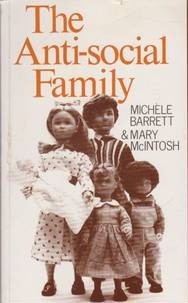Carol Smart on The Anti-Social Family – How the decline of the nuclear family paves the way to communal living

 Last week, on BBC Radio 4’s Thinking Allowed, Carol Smart, professor of sociology at the University of Manchester, discussed the relevance of Michèle Barrett’s and Mary McIntosh’s The Anti-Social Family, published by Verso in 1982, of which a new edition is upcoming in January 2015.
Last week, on BBC Radio 4’s Thinking Allowed, Carol Smart, professor of sociology at the University of Manchester, discussed the relevance of Michèle Barrett’s and Mary McIntosh’s The Anti-Social Family, published by Verso in 1982, of which a new edition is upcoming in January 2015.
The Anti-Social Family decries the idealization of the family put forth by such thinkers as Christopher Lasch, perceiving the family as a haven in a hapless world, but inevitably corrupted by the onset of modern capitalism. The book in turn rethinks the family through a feminist perspective, and denounces it as a structure which “promises so much and delivers so little”. As Carol Smart explains, the book chronicles the authors' disappointment with the family as not being particularly beneficial to women and children, and moreover as possibly being detrimental to a wider, structural, social level. McIntosh and Barrett, and Smart herself, eventually lean “towards collectivized ways of meeting human needs.”
Carol Smart similarly builds on this refutation of the nuclear family by calling to reconsider other ties that focus on the nuclear family tends to devalue: friendships, kinships, relationships to work colleagues. The nuclear family, the default unit in sociology according to Smart, leaves the concept of kinship to anthropology and misses the reality of the bonds and relationships that exist beyong the narrow scope of the "heterosexual couple and children" entity. Carol Smart ended the show by calling on empirical work to be the basis of research conducted on the contemporary status of the nuclear family, to discover the bonds and relationships that perhaps have been strengthened by the family's very downfall. In this line, she refers to her own work on divorce:
Some of the research done on divorcing families where people would most probbaly see a disintegration, what we actually found was, yes, some form of disintegration, some families getting smaller, some people losing contact… but in other instances the boundaries of the family were simply changing, people parenting across households, grandparents remaining involved, and other kinds of relationships were coming in and remaining significant in those kinds of context. So it doesn’t look the same but nonetheless people are supporting one another and helping one another and acting as families.
In line with McIntosh and Barrett’s work, the decline of the nuclear family might very well be the first step towards new forms of communal living, and not the catastrophe often described.
Visit BBC Radio 4’s Thinking Allowed to hear the podcast in full.
